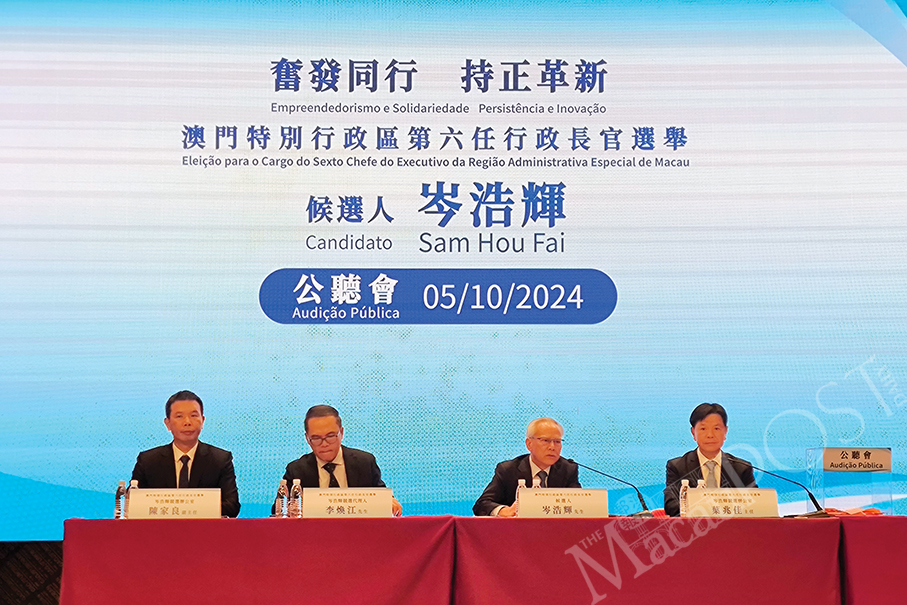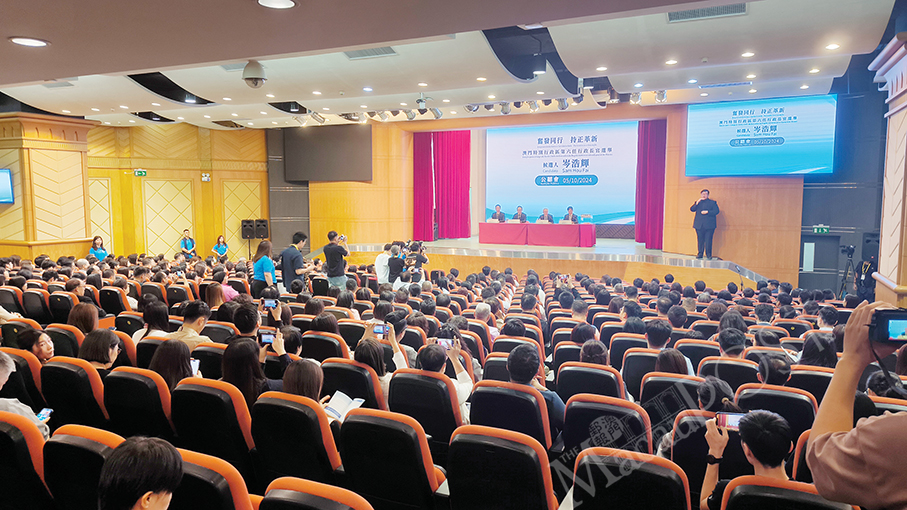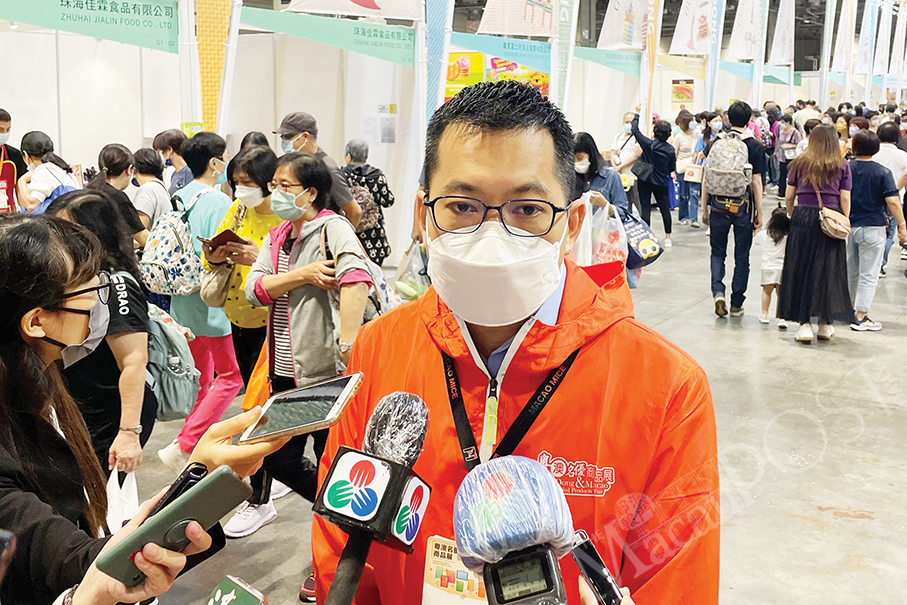During Saturday’s public hearing with residents, chief executive candidate Sam Hou Fai acknowledged that Macau’s competitiveness is lower than the other three designated “core cities” in the Guangdong-Hong Kong-Macau Greater Bay Area (GBA), namely Hong Kong, Guangzhou and Shenzhen, despite the fact that Macau has various unique advantages in the GBA development, which he said Macau has failed to leverage.
The GBA consists of nine cities in Guangdong Province and the nation’s two special administrative regions of Hong Kong and Macau. The nine Guangdong GBA cities include the provincial capital of Guangzhou and Shenzhen, the nation’s high-tech innovation hub. Hong Kong is one of the world’s leading financial centres, while Macau is one of the world’s most popular tourist destinations.
The four cities of Hong Kong, Macau, Guangzhou and Shenzhen are designated as “core cities” in the GBA development, while the other seven cities together form the GBA’s “key node cities”.
The GBA development initiative was launched in 2017, with its outline development plan released in 2019.
Sam’s election campaign office hosted a Q&A session on Saturday afternoon so that he could hear opinions and suggestions from members of the public and answer their questions. The public hearing, which lasted two hours, was held at Hou Kong Middle School (濠江中學) on Estrada de Ferreira do Amaral (亞馬喇馬路), located just a stone’s throw from the headquarters of local power utility CEM.
About 400 residents attended the session, according to Sam’s election campaign office.
Local residents aged 18 or over were eligible to sign up for the public hearing, which provided 400 places. As the number of those who signed up exceeded the number of places available, the participants were chosen by the election campaign office through a lucky draw on Wednesday, after a registration period ran between Sunday and Tuesday last week.
During Saturday’s two-hour session, a total of 11 participants were chosen by lucky draw to ask Sam questions, on topics covering tourism, economic diversification, urban renewal, medical resources, education, low birth rate, population ageing, public administration, Hengqin’s development, and Macau’s participation in the Guangdong-Hong Kong-Macau Greater Bay Area’s (GBA) development.
Sam is the sole candidate for the chief executive election on Sunday, October 13. His ongoing election campaign period runs until Friday.
Macau’s unique advantages
Replying to a question asking how Macau can better participate in the GBA high-quality development by giving full play to its own advantages, Sam noted that the “vibrant” Guangdong-Hong Kong-Macau Greater Bay Area has three different legal and taxation systems in place, which he said can be regarded as a unique advantage that all other bay areas in the rest of the world do not have.
Sam also noted that despite being the smallest in size (33.3 square kilometres) and population (687,000 as of June 2024) among the 11 GBA cities, Macau is designated as one of the four GBA core cities.
Sam underlined that thanks to the implementation of the “One Country, Two Systems” principle, Macau has its unique advantages in linking the nation with the rest of the world. In addition, Sam said, Macau is basically not subject to the restrictions [imposed by certain western countries on China’s access] to high-tech.
Macau has a strong economic foundation and financial reserves, Sam said, adding that Macau is also a very safe city enjoying social harmony.
Sam said that, however, since the launch of the GBA development, he “has not seen” Macau being able to give full play to its various advantages. In terms of different aspects, Sam said, Macau’s competitiveness is lower than the other three GBA core cities – Hong Kong, Guangzhou and Shenzhen.
Sam went on to say that Macau has failed to fully leverage its unique advantages in linking the nation with the rest of the world including Portuguese-speaking countries.
Moreover, Sam said, Macau has also failed to do a good job in terms of the integration and convergence of its regulations with other GBA regions.
“We will need to enhance our competitiveness as we have been weak at giving full play to our advantages,” Sam said.
Sam pledged that his administration would roll out targeted measures to remedy Macau’s various shortcomings undermining its competitiveness.
Diversifying tourism
Replying to a citizen’s question asking how his administration would promote Macau’s development as a World Tourism and Leisure Centre, Sam underlined that his administration would strengthen its leading role in guiding Macau’s six gaming operators to help diversify the city’s tourism products and sourcing of foreign tourists.
Sam also reaffirmed that his administration would consider requiring the six gaming operators to set up representative offices in foreign countries aiming to promote Macau’s tourism.
Sam also said that Macau should strengthen its promotional campaigns in foreign countries about its Historic Centre of Macau which is listed as an UNESCO World Heritage Site.
Replying to another question during Saturday’s session, which was held in the school’s auditorium, Sam reaffirmed that his administration would ensure that the city’s six gaming operators will fulfil the government’s requirements listed in their current 10-year concession agreement to invest in non-gaming attractions and projects during the 10-year period.
In addition, Sam said that his administration would closely monitor whether the six gaming operators are making their non-gaming investments in an effective way and whether “they are investing in the right things and places”.
Iao Hon redevelopment
Replying to another question, Sam also pledged that his administration would launch a project to redevelop seven dilapidated residential estates consisting of low-rise buildings in Iao Hon district.
The government-owned Macau Urban Renewal Limited (MUR) said last month that it was planning to redevelop the seven run-down residential estates into high-rise buildings with 30 floors each, with the number of flats to remain unchanged.
The ramshackle Iao Hon Estate, which was built in the 1970s, comprises seven groups of low-rise buildings. The neighbourhood currently comprises 46 buildings consisting of around 2,500 flats, after four buildings were demolished in 2009.
Sam also noted that the setting up of condominium owners’ management committees of all the 46 buildings has now cleared a major difficulty hindering the Iao Hon Estate redevelopment project.
Sam said that according to the MUR plan, the area would become a “very nice” neighbourhood after its redevelopment.
Moreover, Sam also underlined that pushing ahead with urban renewal in Macau is more difficult than in the mainland and Hong Kong because of Macau’s “complicated” land ownerships.
Boosting birth rate
Replying to another question, Sam said that his administration would roll out different measures aiming to boost the city’s birth rate, which he acknowledged has been decreasing over the past few years.
Sam said that the measures would include tax deductions and exemptions, as well as strengthening financial support for day nurseries, so that parents would have to pay less to send their children to a day nursery.

Macau’s sole chief executive candidate Sam Hou Fai (second from right) addresses Saturday’s public hearing at Hou Kong Middle School as Lei Wun Kong (second from left), the trustee of his election campaign, Ip Sio Kai (first from right), the election campaign office’s head, and Chan Ka Leong, the office’s deputy head, look on. – Photo: Tony Wong

Residents attend Saturday’s public hearing at Hou Kong Middle School’s auditorium when the sole chief executive candidate Sam Hou Fai answered their questions about his election campaign manifesto. – Photo: Tony Wong





